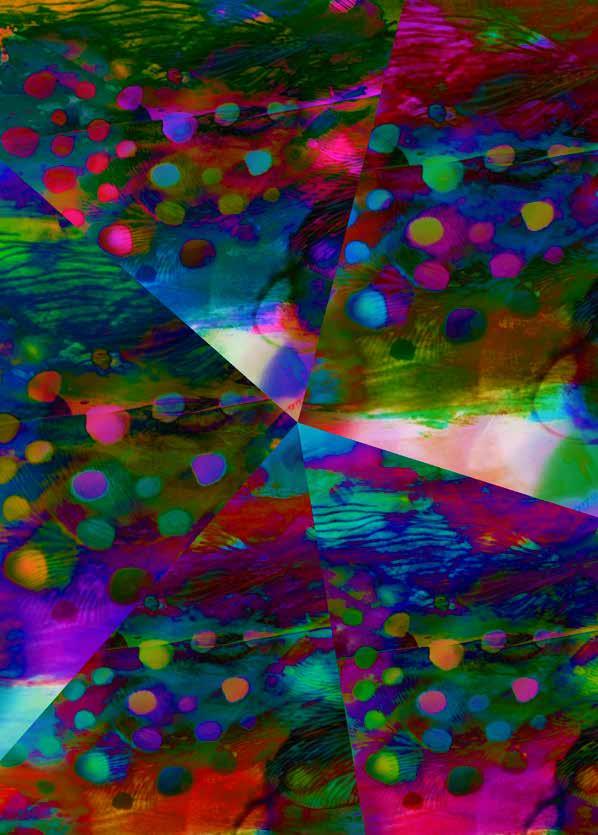


February 2023 Free Online Magazine From Village Earth P O E T R Y & W R I T I N G 2010 - 2022
Cover Artwork by
Irish Artist Emma Barone
Eileen Sheehan Objects of Possibility

© liveencounters.net POETRY & WRITING February 2023 Celebrating 13th Anniversary L I V E E N C O U N T E R S M A G A Z I N E
Photograph by Mark Ulyseas.
©Mark Ulyseas
Support Live Encounters. Donate Now and Keep the Magazine Live in 2023
Live Encounters is a not-for-profit free online magazine that was founded in 2009 in Bali, Indonesia. It showcases some of the best writing from around the world. Poets, writers, academics, civil & human/animal rights activists, academics, environmentalists, social workers, photographers and more have contributed their time and knowledge for the benefit of the readers of:

Live Encounters Magazine (2010), Live Encounters Poetry & Writing (2016), Live Encounters Young Poets & Writers (2019) and now, Live Encounters Books (August 2020).

We are appealing for donations to pay for the administrative and technical aspects of the publication. Please help by donating any amount for this just cause as events are threatening the very future of Live Encounters.
Om Shanti Shanti Shanti Om
Mark Ulyseas Publisher/Editor
markulyseas@liveencounters.net
All articles and photographs are the copyright of www.liveencounters.net and its contributors. No part of this publication may be reproduced without the explicit written permission of www.liveencounters.net. Offenders will be criminally prosecuted to the full extent of the law prevailing in their home country and/or elsewhere.

2023 February POETRY & WRITING © liveencounters.net P O E T R Y & W R I T I N G February 2023
Contributors

© liveencounters.net POETRY & WRITING February 2023 Celebrating 13th Anniversary
February 2023
Eileen Sheehan - Guest Editorial
Anne M Carson
Dirk van Nouhuys
Finbar Lennon
Jean O’Brien
John Grey
John Philip Drury
Luis Cuauhtémoc Berriozábal
Marcella Remund
Michael J Leach
Peter McCluskey
Rachael Stanley
Richard W Halperin
Stephanie Green
Wendy J Dunn

Lynn Strongin
Book review of Cold Night, Long Dog by Jordan Smith
Kassia Klinger
Book review of
Bobish by Magdalena Ball
2023 February POETRY & WRITING © liveencounters.net P O E T R Y & W R I T I N G
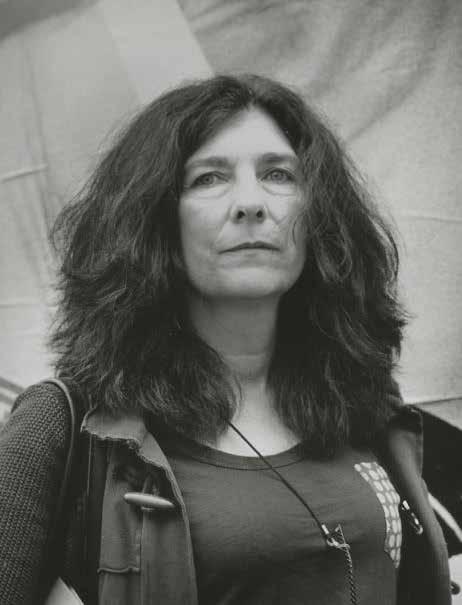
© liveencounters.net POETRY & WRITING February 2023 Celebrating 13th Anniversary G U E S T E D I T O R I A L
Eileen Sheehan. Photo credit: John Minihan.
Eileen Sheehan is from County Kerry, Ireland. Her most recent collection is, The Narrow Way of Souls (Salmon Poetry). A bi-lingual selection from this collection, Duet of Lakes: Eastern-Western Poets in Sympathy, is published by Junpa Books, with Japanese translations by Maki Starfield. She is widely published in journals and anthologies, including; “Days Of Clear Light - A Festschrift in Honour Of Jessie Lendennie And In Celebration Of 40 Years Of Salmon Poetry”( Arlen House/ edited by Alan Hayes & Nessa O’Mahony); TEXT: A Transition Year English Reader (editor Niall MacMonagle / The Celtic Press);The Deep Heart’s Core: Irish Poets Revisit a Touchstone Poem (editors Eugene O’Connell & Pat Boran/ Dedalus Press); and Blackjack, with translations by Oana Lungu (editors Dorina Șișu and Viorel Ploeșteanu / Singur Publishing). A selection of her work appears on Poetry International web with an introductory essay by Paul Casey. She has read at festivals in Ireland and abroad including The Shanghai Literary Festival; the ACIS Conference in Davenport, Iowa; The Cork International Poetry Festival and Listowel Writers’Week.
Eileen Sheehan Objects of Possibility
People with no discernible sense of humour always make me uneasy: and so it was with that austere woman my mother paid occasional visits to when I was a child. It was a time in Ireland when neighbours dropped in to neighbours to catch up on the local news over cups of tea, home-made bread and Marietta biscuits. Usually, I didn’t mind being brought along on these excursions, except for that one house which repelled and fascinated me in equal measure.
The woman lived on her own in a tall, narrow house. We entered by a side door into a small, square hallway which she called the vestibule. To the right was a stairs with wooden handrails along each wall. At the top of the stairs was a small landing with three steps going off to the right, and three steps going to the left.
The landing had a window in front of which stood the strangest plant I had ever seen. It was large and ungainly and always cloaked in dust. The leaves were dull green with pale-silver spots. They were shaped like elongated hearts and when the sun shone through the window a red glow emanated from the underside of the leaves. The sun also made visible an elaborate tracery of cobwebs which seemed to be holding the plant in place, preventing it from tumbling down the stairs under its own considerable weight.
She led us left, into a room of glass walls. The only time she acknowledged my presence was to point to a chair on the far side of the room, indicating where I should sit. She and my mother sat on the other side, speaking in low tones. I imagined that everything she had to say must have been a secret. I contented myself by sitting quietly and studying the objects in the room; sepia photographs in ornate silver frames; a tall lamp with a blue glass globe; walking sticks with silver handles; black lacquered side tables populated with clocks and brass ornaments.
© Eileen Sheehan
2023 February POETRY & WRITING © liveencounters.net
E I L E E N S H E E H A N
Every visit, the same ritual; the stairs with its steps to right and left, the window, the plant precariously balanced on its bamboo stand, the room with three glass walls, the muffled chat. Until one day I broke the dusty spell by walking up to her and asking her what the plant was called. For a second she looked startled, as if she had never realised I could speak.
“It is, of course, an Aspidistra”, she said. Then she looked away from me and everything slipped back to how it had been before.
I carried the word home with me, repeating it under my breath so I wouldn’t lose it on the way.
“Then you’ll remember your life as a book of candles, each page read by the light of its own burning”
Li-Young Lee, from “Become Becoming” / Behind my Eyes
I have always felt that the worlds of memory, dream and imagination are no less real, no less important, than the present waking world we inhabit. Even now, I can’t honestly say if anything I have told you so far is true. Did that woman really exist as I described? Is my memory of her coloured by later additions; things my mother told me; things my sisters may have said? Is she a composite character, made up of all the different older women I encountered as a child? Did I invent her in order to articulate a child’s feelings of unease in strange surroundings?
Does it matter?
She is real to me. She is part of my story. A small part of the memory story that makes me the me that I am.
Did I invent myself? Do we all invent ourselves through the memories we carry?
Memory on its own is probably insufficient for such a huge task. Memory is fugitive, sometimes illusory, often subjective and fractured by emotion: always in danger of being lost. Maybe we create ourselves through the stories we hang our memories on.
© liveencounters.net POETRY & WRITING February 2023 Celebrating 13th Anniversary
G U E S T E D I T O R I A L
Genesis
While my brother was transcribing the Latin names of medicines into cloth-bound ledgers in the office where he worked
and the Woodbine on my father’s lip burnt backwards to a long, grey ash
she freed me into my new element: not a bit amazed at being born.
My sisters were fetched back from the neighbour’s down the road
the eldest who was nine already planning how she’d plait my hair and paint my toenails pink
the other, who was four, locked her great dark eyes on me and swore revenge on this boneless, mottled thing who dared usurp her place as youngest child.
I smiled and father said Ssshh, an Angel ‘s passing somewhere overhead.
I remember none of this.
Eileen Sheehan, first published
© Eileen Sheehan
2023 February POETRY & WRITING © liveencounters.net
E I L E E N S H E E H A N
in The Stinging Fly/ Issue 5/ 1999
I can tell you, that bifurcated stairs was real, and that window and the plant …all real. I carry the image, like a snapshot imprinted on my brain. Child me instinctively chose it as a grounding object on entering that strange house. Child me kept it safe in her memory bank, for future use. I can also tell you that the plant was not, of course, an Aspidistra. Young children believe that adults know everything, so I had not doubted her answer. It was years later I learnt that the plant was a type of Angel Wing Begonia. Through her inadvertent lie she gifted me a new word: a word which I have cared for all these years, a word which is often central to my writing practice.
It was mid-January when I first sat down to write this. I opened a new document, gave it a title, and saved it. Opened it up again and stared at the blank page for the longest time. Truth is, I had no idea what to write about. To compound matters, snow had fallen overnight and it was calling to me to come outside. Snow that stays on the ground, even a few inches of it, is still a rare occurrence in Killarney. Off I went. In my defence: this area is classed as a place of outstanding natural beauty, so how could I resist seeing it resplendent under snow? Besides, my deadline was ages away.
My good friend, Ms Procrastination, happily accompanied me on my ramble through the National Park. All the time I was walking I was also thinking. Opening my mind to the possibility of a subject. As if an idea would suddenly pop up through the snow, waving its little arms, saying, Here I am. Write me!
Well, that didn’t happen.
It was a full three days before I opened up that document again. It was still blank. But this time I meant business. To mitigate against any distractions, I closed my eyes and visualised that stairs, that window, the Aspidistra: grounding myself in my space. As I opened my eyes I noted a small vase that has been on my desk for years.
The vase has a dark blue glaze and is elliptic in shape. It has two faces embossed into its surface. When I noted it that morning it was turned so that I could see half of each face in profile. Janus, the god of two faces: one looking towards the past, the other looking towards the future. Like that stairs, with three steps leading right and three steps leading left. Janus, protector of gateways and boundaries.
© liveencounters.net POETRY & WRITING February 2023 Celebrating 13th Anniversary
G U E S T E D I T O R I A L
I felt as if I had been granted the ability to pass freely through these liminal spaces where memory and imagination, past and future, dream and waking, are all interconnected: real and present.
I touched my fingers to the keyboard, and I wrote:
“People with no discernible sense of humour always make me uneasy: and so it was …”
https://www.salmonpoetry.com/
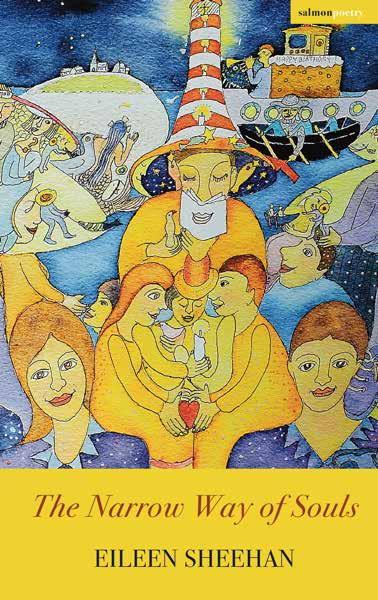
2023 February POETRY & WRITING © liveencounters.net
E I L E E N S H E E H A N
© Eileen Sheehan
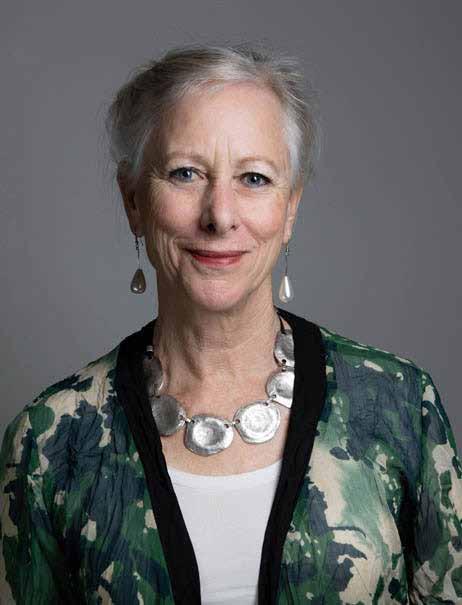
© liveencounters.net POETRY & WRITING February 2023 Celebrating 13th Anniversary F R O M A P O E T I C B I O G R A P H Y O F G E O R G E S A N D
Anne M Carson
Anne M Carson is a poet, essayist and visual artist whose poetry has been published internationally, and widely in Australia, receiving numerous awards including winning and shortlisting in the Martha Richardson medal, and a shortlisting in the 2022 Newcastle Poetry Prize. Her work has been broadcast on national and community radio and she has curated a programme of poems on disability on ABC’s Poetica programme. Recent publications include Massaging Himmler: A Poetic Biography of Dr Felix Kersten (Hybrid), and Two Green Parrots (Ginnindera Press). The Detectives Chair is forthcoming from Liquid Amber Press in 2023. One of her poems has been set to choral music, and she has collaborated with a classical pianist in a number of poetry/ piano story tellings. She has initiated a number of poetry-led social justice projects, including The River Project Soiree as a fundraiser for the RiverKeepers and a greeting card as fundraiser for the Carbon Positive Charity. She is a PhD candidate in Creative Writing at RMIT, writing a poetic biography of George Sand.
from George Sand and I: A Poetic Biography of George Sand
George Sand and son amant, the painter Charles Marchal
1864/65
We stole a delicious week together at Gargilesse. Alex did me the scrupulous
courtesy of not probing the nature of our friendship. His was truly a heart of gold –
after he dies, Charles et moi frequent Chez Brebant to revel in the privacy of public
dining. I show him off, my last late bloom. My great big bear who brings the enlivening
air of youth, whom it pleases me to call mos gros printemps my (very) plump springtimes.
© Anne M Carson
2023 February POETRY & WRITING © liveencounters.net
A N N E M C A R S O N

© liveencounters.net POETRY & WRITING February 2023 Celebrating 13th Anniversary S T O N E S
Dirk van Nouhuys
Dirk is a native of Berkeley, California. He writes short stories, some experimental forms, and occasionally verse, but mostly novels, which have been published as excerpts or serially. About 100 items of fiction and a few poems have appeared in literary or general magazines. He has a BA from Stanford in creative writing and an MA from Columbia in contemporary literature. He worked for decades as a tech writer and manager for SRI’S Augmentation Research Center, Apple, Sun, and others. This century he devotes full time to fiction. He occasionally publishes translations and photography. http://www.wandd.com/about_me.html
This is an excerpt from a novel I am currently working on exposing the history of San Jose, CA.
Stones
A bus carried them for hours through unfamiliar country. Her father was tense and alert. He doffed his fedora and held it in his lap. Franklin sat next to him stiff as well as if miming his father’s rectitude. Her mother slept fitfully, starting awake, looking about sadly and then nodding off. Kyo leaned next to her and woke when her mother stirred. Anne sat upright on her other side and wondered what they thought, as if knowing would still the chaos in the world. Their belongings mingled with those of the other Japanese Americans crowding the overhanging bins and heaping the isles, so that when they stopped and were ordered to disembark there was much clambering and shuffling. Her father paused them with a hand gesture so they emerged last when he could descend with more dignity. They exited into a chill wind blowing sand across an open area beside a barbered wire fence high enough to pause a leaping deer.
The land around the fence was dusty, devoid of plant life; in middle distance Anne could see neat groves of stunted trees; in the distance, mountains shone like photos in magazines. The steady and gusty wind carried away all smell. Japanese America families from scattered buses were scrambling everywhere while Caucasian men stood self-centered, some helmeted soldiers with rifles, others bureaucrats with clipboards responding to Japanese but checking their tags before they spoke. Dad stayed with the kids while Tomomi rushed off to talk with other women. She returned and went with dad to talk to one of the clip board bearers, leaving the kids alone by their bundles. Anne felt like one of the pacific islands where invasion was recounted on the radio. The parents hurried back and joined other families scampering to stake out a place in the barracks.
The barracks were about as welcoming as chicken coups. They were new buildings made of old wood hastily thrown up with single-board walls tar papered on the outside and floors raised a foot on concrete blocks. Each barrack had a single mess hall, an empty recreation room, a laundry room, a latrine divided for men and women, and living spaces, “apartments”, twenty by twenty feet divided by walls one plank thick. Each apartment had a door three steps up from the ground.
2023 February POETRY & WRITING © liveencounters.net D I R K V A N N O U H U Y S © Dirk van Nouhuys
Water ran in the latrines, mess hall, laundry room, and from a tap on the steps to the door of each apartment. When they found a place, her father stood by the door perhaps claiming it or taking it as a vantage point to consider the possibility of community. Her mother sagged to the floor on her knees. The children stood beside her looking for what? — for how they were. There were two single beds and blankets. In the evening word spread among the new apartments that they were to eat the cafeteria of their barrack. Soldiers handed them hard biscuits, dry sausages, hard candy, and chocolate bars, and an officer explained that starting in a few days The War Relocation Authority would provide food and they would run the cafeteria themselves. They did not know whether to eat there or take the food “home”, but soldiers gestured with rifles for them to stay in the cafeteria. Afterward eating they retried, scattered and confused. Neither of the younger children had eaten a meal outside of their house before.
The next day, Tomomi talked with women in the families next to them. Everywhere there were families. Anne could never remember meeting anyone who was not there as part of a family. Men and women who had been living alone joined with their sister or uncle or a family from their town or work. The War Relocation Authority provided food and paid some of the women to prepare it in the cafeteria. Tomomi got one of those jobs. Anne’s father had brought his still and Tomomi brought him home scraps of fruit and a vessel to make brandy. For Anne the still was something warm because her father cared for it and it was a fragment of home; yet she knew, without putting it into words, that he would sometimes get drunk and fade or drop out.
Anne was six now. Disagreements chewed and flared among the Japanese Americans about cooperation with the War Relocation Authority. Some were accused of being spies for the army while others were accused of making life worse by refusing to cooperate. She did not understand the content of the disagreements but could sense the floating hostility and the sense of betrayal. One day when she was eating with her friends, she saw her father and another man in another part of the cafeteria stand and shout at one another. She heard the other man called her father a dog. Her father began punching the man in the chest with the flat of his hands. Was he drunk? The question tightened her stomach. The other man ran out of the cafeteria with her father raging after him, the two dodging tables to the door. Anne was ashamed but did not want to let her father down. She scrambled up from the bench where she and her friends had stopped eating and turned to watch the action. Then, hiding her face with her hand, she ran after them.
© liveencounters.net POETRY & WRITING February 2023 Celebrating 13th Anniversary
S T O N E S
They ran down the stairs where the other man turned to face her shouting father. They began again, embracing, and fell rolling to the dusty ground kicking and biting each other like two cats. Tomomi ran with several men who began kicking them and dragged them apart. When he stood, Tomomi and a neighbour hustled him off to their space. Anne was afraid to go home and went to sit with her friends in the cafeteria, but they sat still around her and did not speak. When she returned to their “apartment” she found her dad asleep sprawled like a starfish on a random place on the floor. Her mother was sitting on one of the two chairs they had scrounged doing something on her lap that Anne was never able to remember while the younger children stood next to her not touching her, but looking into space as if at something their mother was gazing at rather than glancing that the work on her lap.
In a few weeks, the imprisoned citizens were not only allowed but required to pass through the barbed wire to work in vegetable gardens and even allowed to take hikes in the nearby area. Her dad had been working in the garden where his expertise was gratefully acknowledged. A stream ran by the gardens within sight of the watchtowers, it’s rocky shallows dry at this time of year and filled with river-rolled stones of many colors and textures. The watchtowers that guarded the camp were fabricated from the same cast off wood that built the barracks. The floors of the towers were level with the top of the barbed wire, a little like a life guard’s tower, but with thin, waisthigh walls. At all hours, a soldier stood ready with a rifle. Access was by a ladder.
Late on the first day on which he worked in the garden after the fight, the guards were changing. Furukawa walked cautiously toward a solder waiting at the foot of the ladder while his comrade descended. As Furukawa approached, the soldier hefted his rifle but did not lower it. The garden workers and the guards were quietly growing used to one another.
Furukawa respected an armed man, especially when an unarmed man approached him. “Excuse me sir,” Furukawa said, “Sir, may I ask you a question?”
“I ‘spose so.”
“May I go to the creek bed.”
The soldier narrowed his eyes, “The creek bed? Why’s that?”
2023 February POETRY & WRITING © liveencounters.net
D I R K V A N N O U H U Y S © Dirk van Nouhuys
“To gather stones.”
“What do you want stones for?” The guard going off duty had reached the ground and stepped beside him.
“To make a garden by my door to the barracks,” he said. “These are classic garden stones.”
“Classic?”
Furukawa wanted to say, ‘in Japan,’ but of course he didn’t.
The soldier looked at his tag, then the soldiers turned their backs to him and spoke together quietly. They turned back to him.
“We’ll have to ask headquarters,” the first said. “Ask again tomorrow.”
The next day the soldier came to him in the garden and said, “They say it’s OK to take stones form the river bed.”
After that, each time he went to the garden he came back with as many stones as he could carry. They were round or oval, shaped by the creek’s winter rush from the mountains. Their color varied but their texture was the same. They ranged from a few inches to a foot in diameter and varied in color. Some were flattened like rounded stepping stones. At first he piled them in a pyramid by the door to their section of the barracks. In the evening he would sit on the ramshackle steps and survey the stones as if they were an emerging world. Anne believed he told Tomomi things he did not tell the children. What are you doing?” she asked. “Ishi no ue nimo san’nen,” (three years on a stone.) he replied with a Japanese proverb. No, he continued, “I’m going to lay out a garden. It will bring peace.” She asked him if he was building a tower. “No,” he looked at her thoughtfully. His thoughtful look was as warm to her as acknowledgment.
“Can I help?”
“You don’t have to; you can still play.”
© liveencounters.net POETRY & WRITING February 2023 Celebrating 13th Anniversary
S T O N E S
“But I want to help.”
Her father handed her a stone.
Anne went to school with her siblings where they had started to play in groups with their age mates and sit at lunch where they spoke in English. In school it was, she later recalled, where she had begun to think in English, starting with the numbers when they did arithmetic. More and more she sat with her friends even at dinner as the camp turned into a kind of town, a kind of ambivalent dream of an American town. It was not forbidden to speak Japanese, but it was forbidden to write it.
In the afternoon and weekends for a time every day Anne carried stones for her father. Before he settled on the spot for each stone he drew a with a brush and ink a Japanese character on the underside. She could not read them. She carried each in her two hands before her with her shoulders bent to the weight. He would point for her to reset them fractions of an inch, lift them again and put them down again in the loose, dry soil.
At first the garden had no plants. The stones took over access to the steps and the door to their measure of the barrack. Now they guided the family and visitors on a curving path. Beside it her father daily raked another path to look like water. They laid small circles of stones beside the path at irregular intervals. In some he raked the grainy soil. The heap of stones he had brought first still stood but content changed as more stones were placed, and her father brought others from the creek bed. He told her it was a mountain.
He built a screen of broken lumber and reeds gathered from the stream bank that half concealed their steps and the lower half of their door. Gradually her father found and selected small flowering plants and succulents and planted them in the unraked circles beside the path. Anne got the job of watering them with water carried from the public showers in an old Crisco can. Other gardens materialized before other doorways. Men would come and congratulate, and compare their work and exchange ideas, and plants and rocks, walking thoughtfully from the common road to the screen and back again.
2023 February POETRY & WRITING © liveencounters.net
D I R K V A N N O U H U Y S
© Dirk van Nouhuys
One day the garden builders formed a group and visited each garden. They gathered in Furukawa’s first and spent the afternoon walking the camp comparing notes, admiring arrangement, and granting praise to each man’s work. Anne did not go with them, but she felt his pride. In the evening they returned to Furukawa’s where they went into his ‘apartment’ and partied. Tomomi hustled the children off to the spaces of friends. Furukawa had stopped drinking when he laid the last stone of the path, but, when Anne came home, she found him sprawled on the floor and her mother lying in their bed with her face to the thin wall. Anne’s pride stuttered.
Her friends from school and dinner did not always understand why their fathers made the gardens. It was the girls who wondered; the boys were too busy playing baseball. One day Anne asked him what the garden was for. “It is our peace,” he said.
© liveencounters.net POETRY & WRITING February 2023 Celebrating 13th Anniversary
S T O N E S

2023 February POETRY & WRITING © liveencounters.net D I R K V A N N O U H U Y S
© Dirk van Nouhuys
The Mochida family before their relocation to an internment camp for Japanese Americans; photograph by Dorothea Lange. National Archives, Washington, D.C. (ID: 537505). https://www.britannica.com/event/Japanese-American-internment
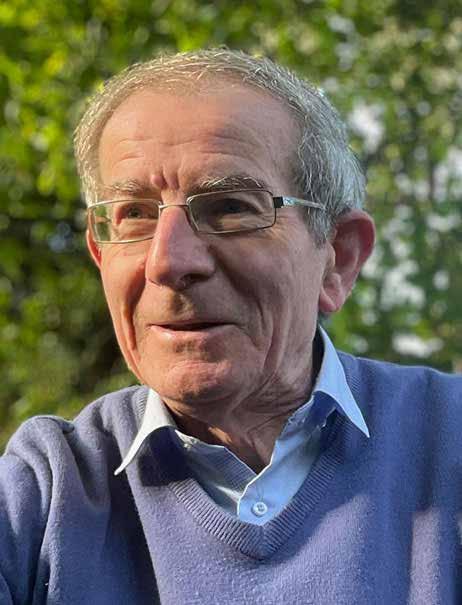
© liveencounters.net POETRY & WRITING February 2023 Celebrating 13th Anniversary B I R D K I L L
Finbar Lennon
Finbar Lennon is a retired surgeon, accidental author and poet. He co-authored his late wife’s memoir ‘The Heavens are all Blue’ published by Hachette Ireland in 2020. He is the author of three collections of poetry, ‘NOW’, ‘A Thimble on her Finger’ and ‘Voices’, his latest collection that will be launched in March 2023 (Lapwing Publications, Belfast, 2021/2022). The role and place of poetry in the modern world are explored in his new collection.
Bird Kill:
A bird, grey-white, pigeon-sized glimpsed seconds before demise low flight from nearby build –lazy landing on center line reluctant visitor to strange place curious affect - in another space my eye caught moment of the strike shock burst of fluffy feathers spread sight of sparks and blaze once shed no bang , a muffled sudden clunk car did not slow – did not know bare bird’s body shorn of coat and cover forlorn, lying still on concrete as slow rise of weightless plumes elevated by passing wind to follow innocent killer fading in the distance they stayed aloft and lingered long before finding rest on side of road the only witness I, a single passer-by returned next morning to figure kind dead dry splash with pasted remnants wing and semiplumes on kerbside near I wonder who sent this bird my way to end in awe on busy motor lane?
2023 February POETRY & WRITING © liveencounters.net F I N B A R L E N N O N © Finbar Lennon
Buck Teeth:
I bit my tongue this time knew blood would come even from a gentle bite always an unwelcome sight surge of red with chew before appetite askew lips and lining inside mouth usual mark for errant teeth effortless to surface split a napkin or handkerchief never fails to tell tales of thinning blood and leaks pressure on the flow of life to stop molars in their tracks along old uneven mouth line a rinse a way to measure loss remedy to eat alone or play deadpan with a dental stick!
© liveencounters.net POETRY & WRITING February 2023 Celebrating 13th Anniversary
B I R D K I L L
The Second Culture:
Found in beds, clinics and surgeries filling hospitals and practices outside lonely anxious people tom and mary waiting for attention, happy to disclose all their ills and bare their bodies for friends they trust will make them well.
Come in and visit the humanities it’s a plural, not on curriculum just floating about interfering with the business of medicine blood tests, scopes and x-rays decisions outside line of vision.
“It’s a funny weakness in my left leg goes away if I stand or rest and then comes back for no reason.” Hold on in next cubicle albert is explaining –“a lightness in my head, at times my knees give way- first time last Friday.”
What next? no tests? more questions yes so ‘leg work’ done before it reaches top! “I have a fantastic problem for you sir –cost him his job, took his own termination weak lower limbs, pins and needles for 20 years at work on his feet all day – that’s the sole issue!”
Clinical case studies for cognitive consultants with time to spare an ear for tom and mary his/her test of acumen - solve without recourse to tests – answers often hiding in the history cure not always pills and scalpels– just time enough to set aside to listen and advise.
2023 February POETRY & WRITING © liveencounters.net
F I N B A R L E N N O N © Finbar Lennon
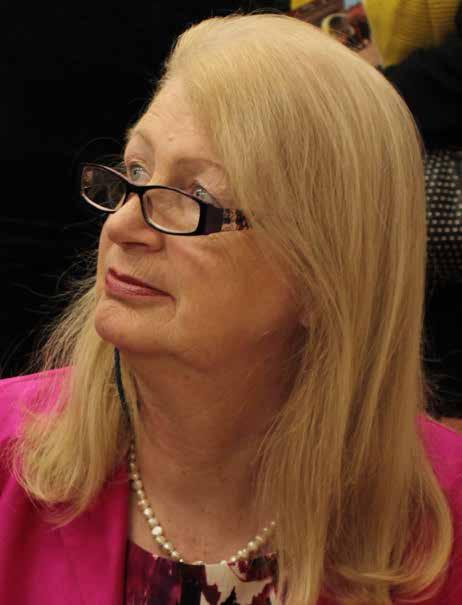
© liveencounters.net POETRY & WRITING February 2023 Celebrating 13th Anniversary C R E T E
Jean O’Brien
Jean O’Brien’s latest collection (her sixth), Stars Burn Regardless, came out last spring from Salmon Poetry. She was the 2021 Poetry in Residence in the Irish Cultural Centre in Paris and the 2017/18 Kavanagh Fellow. Her work appears regularly in journals and magazine both on and off line. She holds an M.Phil in creative writing/poetry from Trinity College, Dublin (Ireland) and tutors in same. http://www.jeanobrienpoet.ie/
Crete
Everyone says the light is different here and yet, as everywhere, the moon still rises, the sun still sets and clamorous clouds scud across the sky.
We lie in bed long past decency, listening to local life below. We have the questionable luxury of a two-windowed room, both facing a yellow-brick ruin.
No sign here of sunlight flecked on sea, no swell of cumulus clouds, nor sight of the cicada or cricket racketing the trees, but even with the blinds
at half mast and the shutters almost closed along with the rise and fall of fast Greek speech, the luminous light somehow seeps in.
2023 February POETRY & WRITING © liveencounters.net J E A N O ’ B R I E N
© Jean O’Brien
Hireath
(Welsh for a longing for a place long gone or even a place you have never been).
The air around her quivers full of ghosts and noises shadows and slanted fingers of sunlight.
Her hands reach towards invisible things, She wants to go back to her empty centre, fill it with her heart-home of childhood, where love was the mother-tongue.
She believes Hybrasil was her home. Now another seven years is up, the mist clears and we shed our old skins, lose our flesh in the mess and dreck of what is lost.
The longed for island is still unreachable. Her adult children gentle her back to the ward with soothing murmurs, sweet treats, little lies. They brush the silver hair clouding mist like about her head.
Still she cries, the absence a fist in her heart, knotted with a restless need.
© liveencounters.net POETRY & WRITING February 2023 Celebrating 13th Anniversary
C R E T E
Water Always Dreams of a River
And a river dreams of the sea. When the cast-iron gutter finally broke a weight of water cascaded down on the front step. We called a man who reassured us he would fix it, patch a join with plastic that from the ground would look the same. He attached the lightweight plastic to its more solid cast-iron sisters, but something had disturbed the flow, interrupted the equilibrium. Did he not know that water always strives to find its own level, to dissolve itself in itself. The transition from the weighty iron to the lighter material caused a hump when the rain came, the created eddies then found an outlet that built itself up to a noisy stream as it bounced off the white gas box fixed to the wall. Some things just look for trouble and not every cloud has a silver lining, we are all seaward dreamers.
2023 February POETRY & WRITING © liveencounters.net
J E A N O ’ B R I E N © Jean O’Brien
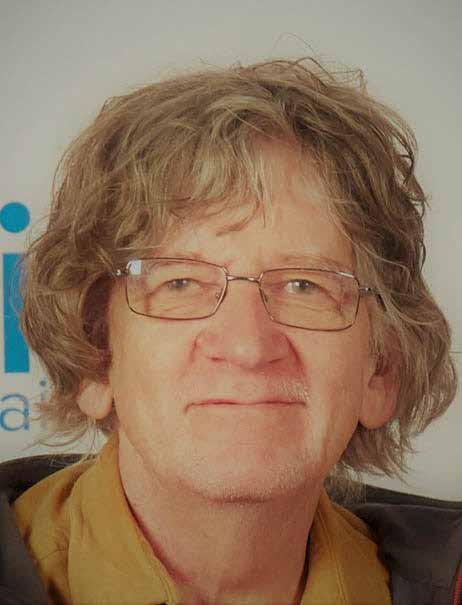
© liveencounters.net POETRY & WRITING February 2023 Celebrating 13th Anniversary N O M O R E N E I G H B O R S
John Grey
John Grey is an Australian poet, US resident, recently published in Sheepshead Review, Stand, Poetry Salzburg Review and Hollins Critic. Latest books, “Leaves On Pages” “Memory Outside The Head” and “Guest Of Myself” are available through Amazon. Work upcoming in Ellipsis, Blueline and International Poetry Review.
A week in Puerto Rico
The English is intermittent and often incoherent. Clothes are loud but then so is the sun. No drink is served without a complementing umbrella. Hard to believe that it’s January somewhere, that snow is falling, and houses look like frozen bunkers. The ocean here has no concept of seasons. Nor do the torches that flash on after dark, light the path between drunkenness, bonhomie and sleep. Come morning, I walk the beach, my surprising energy sprinkled with salt, the sand in my sandals coming and going, breeze off the waters, as much a remedy as the cherry-topped Pina Colada at dusk. I’m only here a week and yet I feel like some exile writer, a less-macho Hemingway inspired to put it all down on paper but doing no such thing. Ideas are born in hibiscus and palm trees, lift off on the wings of gulls and terns, gestate in the bulbous jaws of pelicans, and the constant rolling waves, the foam that inhabits my naked toes. But, without cabin fever, they go no further. Without the January in my future, the pleasurable lazy present would be stillborn.
2023 February POETRY & WRITING © liveencounters.net
J O H N G R E Y
© John Grey
No more neighbors
Her next door neighbors are loading up a moving van. They’ve sold the house. They’re going elsewhere.
After all these years, dwelling side by side, she hardly knows them but, just being there, they were a comfort, like an old shawl, and now that warmth is being taken away from her.
She lives alone but now considers the possibility, the assuredness in fact, of loneliness.
The dark will be so much darker. Her home, her yard, no matter the time of day, will attract the shadows more than they do the light.
© liveencounters.net POETRY & WRITING February 2023 Celebrating 13th Anniversary
N O M O R E N E I G H B O R S
She listens to the mayhem of heavy furniture being lugged from door to truck, boxes and boxes following in the wake. The neighbors look weary but happy with the change. She doesn’t remember what change feels like.
She stands out on her porch but the neighbors don’t seem to notice her. A moth flutters about the bulb above her. That insect could be it as far as company goes.
She can’t remember if the woman’s name is Dawn or Diane. Goodbye somebody, she says under her breath.
2023 February POETRY & WRITING © liveencounters.net
J O H N G R E Y
© John Grey
Our houses
The town made no secret of who had money and who did not. Houses either blared their wealth or hid behind the shame of poverty. Walking the streets was like breaking into bank accounts. Red or black, made no difference with the rich. It was the number of commas that staggered. The poor nudged a little in debt, a little to the good, but never too far from zero. It was an America where some people lorded it over the rest of us with the size of their yards, the fancy gates, the Mexican landscapers, the expensive cars in the driveway. They reveled in the smug grin of having made it or, at least, being born into winning families.
I tried to be jealous but couldn’t work up enough greenness. Besides, I owned 200 books.
© liveencounters.net POETRY & WRITING February 2023 Celebrating 13th Anniversary
N O M O R E N E I G H B O R S
I doubted the rich had that many between them. And I could play the guitar. None of the fortunate ever wanted for enough to set their needs to music. I left home eventually, moved into a bigger house, but not a mansion. People passing by would not have their empty pockets admonished by a balcony, a terrace. They might think, here is a man who lives comfortably. Some might even take comfort in that.
2023 February POETRY & WRITING © liveencounters.net
J O H N G R E Y © John
Grey
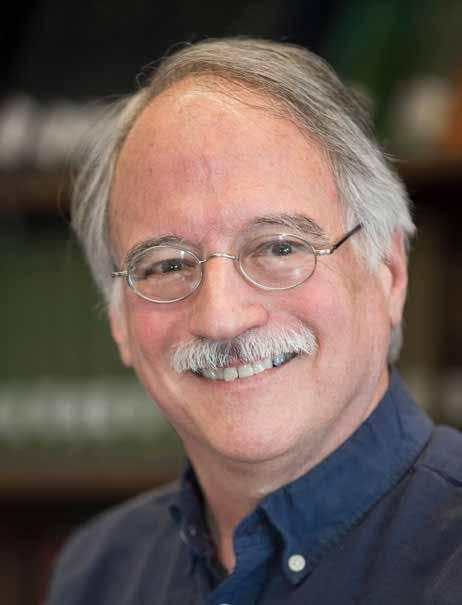
© liveencounters.net POETRY & WRITING February 2023 Celebrating 13th Anniversary G H A Z A L O F T E A C H I N G
John Philip Drury
John Philip Drury is the author of four full-length poetry collections: The Disappearing Town and Burning the Aspern Papers (both from Miami University Press), The Refugee Camp (Turning Point Books), and most recently Sea Level Rising (Able Muse Press). He has also written Creating Poetry and The Poetry Dictionary, both from Writer’s Digest Books. His awards include an Ingram Merrill Foundation fellowship, two Ohio Arts Council grants, and the Bernard F. Conners Prize from The Paris Review. He was born in Cambridge, Maryland, and grew up in Bethesda, raised by his mother and a former opera singer she called her cousin but secretly considered her wife. After dropping out of college and losing his draft deferment during the Vietnam War, he enlisted in the Army to learn German and served undercover in the West German Refugee Camp near Nuremberg. He used benefits from the GI Bill to earn degrees from Stony Brook University, the Writing Seminars at Johns Hopkins, and the Iowa Writers’ Workshop. After teaching at the University of Cincinnati for 37 years, he is now an emeritus professor and lives with his wife, fellow poet LaWanda Walters, in a hundred-year-old house on the edge of a wooded ravine.
Ghazal of Teaching
Walking to class, I feel like a vicar without a god, moved to minister but inclined to doubt a god.
Once, religion persuaded this lazy boy to study, finding the Word in confirmation classes about a god.
Breakfast club in a church’s basement made me born again, so I outlined Colossians, eager to tout a god.
But the fog burned off. On the first day of basic training, I put NO RELIGION on my dog tags, ready to flout a god.
I enlisted to avoid being drafted during wartime, to learn how to become a poet. The word was the way, with or without a god.
I’ve followed two great-grandfathers, William and Augustus, into a sort of ministry, where I need not believe in—lazy lout!—a god.
2023 February POETRY & WRITING © liveencounters.net
J O H N P H I L I P D R U R Y © John Philip Drury
Learning How to Refer to My Daughter
They work in virtual reality, programming in an Oculus Rift headset, using binary every day, typing on their laptop, developing simulations.
Neither zero nor one themselves, they resemble Walt Whitman, containing multitudes of gender and non-gender, answering to a nickname, Becky, which my bisexual mother found harsh, unfeminine.
They claimed they were suicidal in their dorm room and tried to hang themselves in a stairwell (I rolled my eyes) but conceded “I’m just no good at knots” (I laughed like one of Jane Austen’s gentlemen).
They didn’t know I was trying to discourage their impulse by ridicule, because my grandfather poisoned himself, because the chandelier crashing in Crimes of the Heart turns melodrama
into slapstick, so everyone can bear what’s buried in the mind and in the ribcage— a black hole that is lonely, cramped, and sexless, the real reality of inner space.
© liveencounters.net POETRY & WRITING February 2023 Celebrating 13th Anniversary
G H A Z A L O F T E A C H I N G
Identifying Leaves
Walking the dog, I pass a stucco house next to a sprawling tree whose fall leaves dazzle— red and shiny as slices of currant preserves. From the sidewalk, under the yellow leafage of a tulip poplar, I can’t identify the tree that huddles against the gray-walled house, but one day I walk my dog down the driveway and pluck a red leaf from a low-hanging branch. The stems are alternate, not parallel, leaves oval, not lobed, their thickness like vellum, glossy on top and downy underneath. Dogwood? No, it’s too big for the tree Jesus was nailed to, as the legend goes. Black locust? No, there aren’t any hanging seed-pods. Shingle oak? Maybe, but where are the acorns? We walk back home, under a canopy of linden, sweet gum, ash, catalpa, beech.
I put the leaf on a pile of folders on the dining-room table I use as a desk, meaning to pull down a field guide from the highest book shelf, but I’m distracted. When I return, a fragment of leaf and stem remains, and I remember our Siamese cats sitting erect like vases on the table. We can’t arrange cut flowers because they bite off blossoms, decapitating day lilies, and scatter them on the floor. I’m sure they’ve mutilated the leaf. I could get another, of course, but it’s drizzling outside, the dog wants to stay curled up on the couch, and most of the deep red leaves have already descended into a bed of ivy around the trunk. Does the name matter? Damn cats. Yes, it does, for names are how we savor and ingest the ephemeral sweetmeats on the laden table of the world. Not knowing just leaves me hungry.
2023 February POETRY & WRITING © liveencounters.net
J O H N P H I L I P D R U R Y © John Philip Drury

© liveencounters.net POETRY & WRITING February 2023 Celebrating 13th Anniversary T I M E A N D I T S L A B Y R I N T H S
Luis Cuauhtémoc Berriozábal
Luis Cuauhtémoc Berriozábal, born in Mexico, lives in California and works in Los Angeles in the mental health field. He is the author of Raw Materials (Pygmy Forest Press), Before and Well After Midnight (Deadbeat Press), Peering into the Sun (Poet’s Democracy), Songs for Oblivion (Alternating Current Press/Propaganda Press), and Make the Water Laugh (Rogue Wolf Press). Kendra Steiner Editions has published 8 of his chapbooks, the latest one, Make the Light Mine. Luis graduated from Cal Poly Pomona, earning a degree in Finance, Real Estate, and Law. He earned his Masters in Public Administration from Cal State Northridge University.
Time and its Labyrinths
Time and its labyrinths, labyrinths and time, so where did the body vanish?
Lorca, your soul remains.
Your heart is in Spain. The fountains of blood know not where a body vanishes.
You were no illusion and your killers will pay as their souls vanish into oblivion.
Only time will tell. Lorca, your soul remains. A thousand years, your words will remain, a desert oasis of deep songs.
2023 February POETRY & WRITING © liveencounters.net
L U I S C U A U H T É M O C B E R R I O Z Á B A L
Berriozábal
© Luis Cuauhtémoc
When We Were Children
When we were children our dreams were matchless in our minds.
The sky was a place we could fly like some human wingless bird and the moon was see-through and the sun was a yellow baseball that left you weeping for staring too long.
The mountains we drew as children always had sharp points.
© liveencounters.net POETRY & WRITING February 2023 Celebrating 13th Anniversary
T I M E A N D I T S L A B Y R I N T H S
This Other World
The dark blank sky is immense. I have been closing my eyes off and on, yet the immensity grows. The lone sphere is either the sun or moon. This world’s not one I have seen. The aloneness of it only makes me long for the world I ran from in a state of anguish and panic. In my time away, I have missed the plants, the animals, and the smells of the city. This other world I have created in my mind is immense, sprawling with blankness and a lone sphere that does not burn or shine.
2023 February POETRY & WRITING © liveencounters.net
L U I S C U A U H T É M O C B E R R I O Z Á B A L © Luis Cuauhtémoc Berriozábal
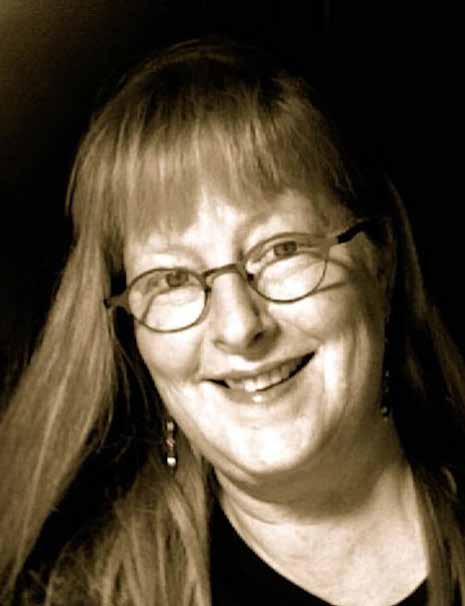
© liveencounters.net POETRY & WRITING February 2023 Celebrating 13th Anniversary R E L E A S E
Marcella Remund
Marcella Remund is from South Dakota in the American heartland, where she taught at the University of South Dakota. Her poems have appeared in numerous journals. Her poem “Caught” won first prize in the 2022 O’Bheal International Five Words Poetry Competition in Cork, Ireland. Her chapbook, The Sea is My Ugly Twin, was published by Finishing Line Press in 2018. Her first full-length collection, The Book of Crooked Prayer, was published by Finishing Line in 2020. You can find more information and links to her books, at https://www.marcellaremund.com/
Release
In the un-earthing, when whatever remains of us is released from our crumbling
bodies, perhaps our sparks will unfold wings of silver-white light and free at last we will, for a time,
ride the grey horizon until we lift, melt into the star-sequined dark, until our lights are brief pin-pricks
in the velvet black and we, pure joy. Perhaps back down here, a few of us will look up, button up tight
our coats of longing and grief, cover our heads, quiet our hands in deep pockets, and turn into the wind.
2023 February POETRY & WRITING © liveencounters.net
M A R C E L L A R E M U N D © Marcella Remund
Cusp of morning
In those moments when you float and drift near the open door of your dreams, somewhere between a locked iron gate so tall you can’t make out its finials among clouds, and the home of your youth, eternally on fire but without ash or cinder, you hear a voice half singing, Wake,
dear one, wake. But you roll your eyes back in your head, turn onto your side and keep dreaming, curious to see who else comes to warm themselves at the flames, or what three-toed creatures climb the gate and disappear in the clouds, in a sky that shifts just now, whooshes below your feet as you lift your sudden wings, tilt your head just so, and bank toward a sliver of moon.
© liveencounters.net POETRY & WRITING February 2023 Celebrating 13th Anniversary
R E L E A S E
The time before
In the time before, when fontanelles were still open, I moved easily between body and There like moving between a small room and an endless wild garden.
In the time before, we recognized each other by the pulsing signatures of our heartlights, the timbre of waves and frequencies, the reach of rays.
So much from the time before is gauzy memory now, quick pictures that roll past just before sleep, like loose film reels left to spin, flap.
I wake feeling the wrap of your thighs
There—were dark and light the same There? Was there a cat sleeping on a chiseled stone? Was I singing, holding you, you holding me?
In this time of yellowed paper, fading pictures, dust, let us keep a toe in the doorway, keep the way clear so together, we can make our way back There, home to the time before.
2023 February POETRY & WRITING © liveencounters.net
M A R C E L L A R E M U N D © Marcella Remund
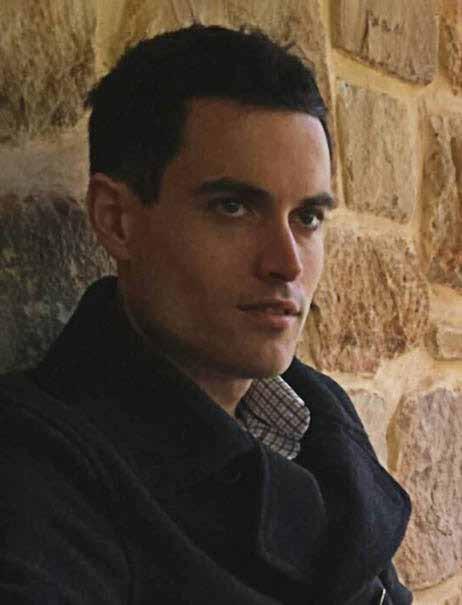
© liveencounters.net POETRY & WRITING February 2023 Celebrating 13th Anniversary G R A T I T U N E S
Michael J. Leach
Michael J. Leach (@m_jleach) is an Australian poet, critic, and academic who works at the Monash University School of Rural Health. Michael’s poems have appeared in journals such as Cordite and Live Encounters, exhibitions such as the Antarctic Poetry Exhibition, anthologies such as Poetry d’Amour 2022: Love Poems (WA Poets Incorporated, 2022), and his two poetry books: the chapbook Chronicity (Melbourne Poets Union, 2020) and the full-length collection Natural Philosophies (Recent Work Press, 2022). Michael has won the UniSA Mental Health and Wellbeing Poetry Competition (2015), received a commendation in the Hippocrates Prize for Poetry and Medicine (2021), and jointly won the poetry category of the Minds Shine Bright Confidence Writing Competition (2022). He lives on unceded Dja Dja Wurrung Country and acknowledges the traditional custodians of the land.
Gratitunes
Thank you, dear mother, for getting me into soul, most notably the music of Four Tops, The Supremes & Aretha Franklin.
Thank you, dear sister, for getting me into pop rock, most notably the music of Paramore, Lana Del Rey & Panic! at the Disco.
Thank you, dear brother, for getting me into ska, most notably the music of Less than Jake, early No Doubt & The Mighty Mighty Bosstones.
Thank you, dear father, for getting me to occasionally take out my headphones & tune in to the ambience.
© Michael J. Leach
2023 February POETRY & WRITING © liveencounters.net
M I C H A E L J L E A C H
Twenty-Six Things
I Remember about My Mother
1. Her aptitude for antiquities
3. Her celebrated celebrations
5. Her everyday endurance
7. Her genuine generosity
9. Her in-demand intuition
11. Her knowledge of knickknacks
13. Her Motown music
15. Her optimal originality
17. Her quixotic questions
19. Her sublime selflessness
21. Her unknown undertakings
23. Her way with wrought words
25. Her yearned-for yesterdays
2. Her briskly read books
4. Her demure dresses
6. Her fantastic food
8. Her heart-warming heart
10. Her jolly jokes
12. Her lively loquaciousness
14. Her no-nonsense nature
16. Her philosophical philosophy
18. Her resilient relationship
20. Her tireless truthfulness
22. Her virtuous volunteerism
24. Her X-marked X-rays
26. Her zigzag sign of the zodiac
© liveencounters.net POETRY & WRITING February 2023 Celebrating 13th Anniversary
G R A T I T U N E S

2023 February POETRY & WRITING © liveencounters.net M I C H A E L J L E A C H
© Michael J. Leach
©Mark Ulyseas
Photograph by Mark Ulyseas.

© liveencounters.net POETRY & WRITING February 2023 Celebrating 13th Anniversary C R I S I S - W H A T C R I S I S
Peter McCluskey
Peter McCluskey is a fiction and poetry writer from Dublin, Ireland and has published 4 contemporary novels to date. His second anthology of poetry, “Crisis, What Crisis” is due for publication Autumn 2023. For the past fifteen years he has been lecturing on the subject of the music industry/ music publishing and copyright. Peter is also a certified TEFL teacher and teaches English as a foreign language to students all over the world. He has a wide breadth of experience in providing articles and news stories to major print and online music and social media magazines and newspapers. He also creates and narrates videos for a number of his fellow poets. He previously spent some time as a music press photographer and also ran his own record label. He holds a Science Degree in I.T. and Diplomas in Advanced Web Design from Dublin City University. His fifth fiction novel will be published early 2023.
Crisis - What Crisis
The pubs were closed.
Do you remember it?
Will we ever forget, said my friend.
The pandemic.
Human life at risk.
And the media telling us the pubs are closed. We were stricken by the horror of it. Our European friends were baffled.
Really?
Seriously?
The pubs are closed?
What about the hospitals, the vaccinations, the sick?
We clutched our Guinness beer mats to our breast, a tear rolling down our collective national cheek and wondered why our foreign neighbours couldn’t empathise with us.
You just don’t understand, we cried into our empty glass. The pubs are closed.
So we resigned ourselves to a moral victory, a pyrrhic victory - we decided to tell them that everything would be…..GRAND.
2023 February POETRY & WRITING © liveencounters.net P E T E R M C C L U S K E Y
© Peter McCluskey
Actually Going Outside
We decide to do the cliff walk from Bray to Greystones even though the day is grey and the heavy clouds are low overhead with a distinct possibility that it will bucket out of the skies but we don’t care because we’ve set aside the day for this and a few pissy showers aren’t going to stop us from making the journey along the winding Wicklow coastline because we promised ourselves we’d do it and we want to stick to our guns this time because we’ve spent too long putting things off and wasting our time on Facebook and You Tube and prevaracation and telling our friends all the interesting things we do when in reality it’s a virtual reality we’re fabricating that is more or less an entangled mass of tissued stories and tall tales and posed-for selfies to delude ourselves and others that we have an actual life but not this time because this time we are actually going outside.
© liveencounters.net POETRY & WRITING February 2023 Celebrating 13th Anniversary
C R I S I S - W H A T C R I S I S
The Forty Foot
I met a man - a man with one line of dialogue. He emerged out of the sea as if in slow motion. His face had a soft beatific smile - a smile of contentment.
A glow seemed to seep from him - his every pore illuminated with the stuff. I descended a step or two on the narrow rock stairs. The cold, foaming sea water grabbed at my ankles. “How’s the water?” I inquired.
But he didn’t hear me, the wind whipping my voice off out to sea, whipping it so fast that I don’t think I even heard it myself. The man looked up towards me as I silently mouthed my question.
A calmness filled his progress up the rock steps as he emerged from the rising tide. The man has just one line of dialogue. He took one last fond look into the sea and as he passed me by he said: “Well, that’s washed that day away.”
2023 February POETRY & WRITING © liveencounters.net
P E T E R M C C L U S K E Y
© Peter McCluskey
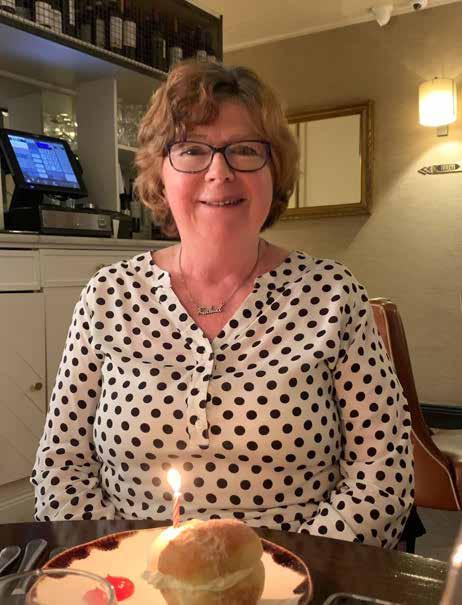
© liveencounters.net POETRY & WRITING February 2023 Celebrating 13th Anniversary P A P A D O N ’ T P R E A C H
Rachael Stanley
Rachael Stanley has been published in various journals and anthologies of which her most recent published work appeared in issue 6 of Drawn to the Light Press. In September 22, her poem Destruction on an anti-war theme was exhibited on the Smashing Times International Centre for the Arts & Equality website for Culture Night. Her work has also appeared in the Wild Ireland Calendar for 2022 published by the Irish Peatland Conservation Council. She was commended in the Francis Ledwidge Poetry Competition in 2019 and again in 2022. She is a member of the Rathmines Writers Workshop and has been a recent participant in the Over the Edge writing workshops organised by the late Kevin Higgins. She lives in Dublin.
Papa Don’t Preach
I could retrace my steps go back in order to go forward.
I could try and remember what it was to look at things before I learnt to name them.
I could look anew at all living things behind and beyond them to learn how all possibility starts from emptiness.
I could step onto the yoga mat each morning stretch, bend and rediscover my spine vertebrae by vertebrae.
I could come down off this serious high horse and discover great freedom in laughter.
I could take on board Gandhi’s words of wisdom and become the change I wish to see in the world to avoid the futility of preaching.
2023 February POETRY & WRITING © liveencounters.net
R A C H A E L S T A N L E Y © Rachael Stanley
Words of Love
i.m. Mum
I felt compelled to write to you after your death clung to my bones
to my sorrow, I was not with you in those final hours though
I sensed somehow that it was to be that very evening in fact I prayed that you would be released and whispered in your ear that you were full of love
and it was okay to just slip away and let go… but when I got word that it really had come to pass I sat down and wrote a love note to you in green biro all I could find at the time
© liveencounters.net POETRY & WRITING February 2023 Celebrating 13th Anniversary
P A P A D O N ’ T P R E A C H
I read it over and over until the day came when I let it go knowing that ultimately everything must be let go then, years later on a day when April sunshine
poured in through the window, while spring cleaning a dusty book
your note of love and thanks slipped out between the pages.
2023 February POETRY & WRITING © liveencounters.net
R A C H A E L S T A N L E Y © Rachael Stanley
Water
I fill the glass and contemplate the clear liquid remembering who I am. We are creatures made of water held inside this sacred chamber before birth, our tears taste of salt.
In time perhaps we may return to the ocean like ancient cities buried beneath the sea. It is good to be reminded of water
how it breathes new life to parched lands how it cleanses past hurts how it washes everything back to innocence.
© liveencounters.net POETRY & WRITING February 2023 Celebrating 13th Anniversary
P A P A D O N ’ T P R E A C H

2023 February POETRY & WRITING © liveencounters.net
©Mark Ulyseas
R A C H A E L S T A N L E Y © Rachael Stanley
Photograph by Mark Ulyseas.
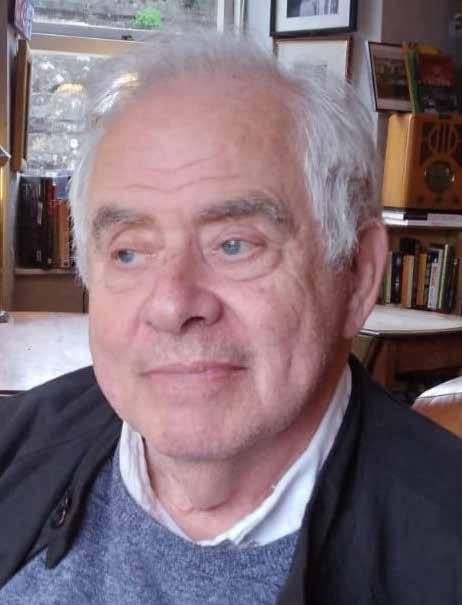
© liveencounters.net POETRY & WRITING February 2023 Celebrating 13th Anniversary B E N J A M I N B R I T T E N W A R R E Q U I E M
Richard W. Halperin. Photo credit: Joseph Woods.
Richard W. Halperin holds Irish-U.S. nationality and lives in Paris. Since 2010, he has published four collections via Salmon Poetry, Cliffs of Moher. The most recent is Catch Me While You Have the Light, 2018. In complement, he has published sixteen shorter collections via Lapwing, Belfast. The most recent is A Ballet for Martha. In 2023, Salmon will bring out a Selected & New Poems, which will include poems from both publishers.
Benjamin Britten War Requiem
Recording, live at Coventry Cathedral (rebuilt; it had to be rebuilt) 30 May 1962. Harper, Pears, Fischer-Dieskau. The pity of war. Not my fault. But how can I not feel guilty? A testament, written, played. Heard. Heard by whom? I have two records (I still call them records)
which are supreme: this one and the Klemperer Messiah. Even if they had never been
performed, even if they had stayed on Handel’s and Britten’s desks, Spinoza (so a friend tells me;
I never read Spinoza) would have said God read them, God heard them. I once wrote in a poem that God
blubbered at Golgotha, whatever Jesus is said to have done. Where is fault? I do not know.
Where is shame? I know where. In me. And it continues. As I write this: war. Shown nightly on television. Between sandwiches. What is the gravy made of, please? What is the gravy made of?
2023 February POETRY & WRITING © liveencounters.net
R I C H A R D W H A L P E R I N
© Richard W. Halperin
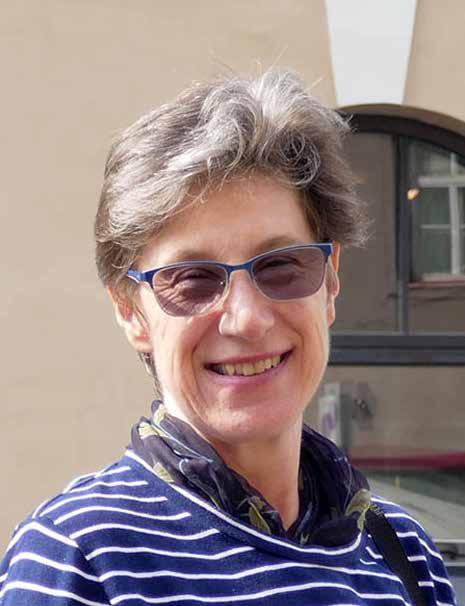
© liveencounters.net POETRY & WRITING February 2023 Celebrating 13th Anniversary W I N T E R
Stephanie Green
Stephanie Green has published short fiction, poetry and travel essays in Australian and international journals, including Burrow, StylusLit, Meniscus, Text and Axon. Her work is also included in recent anthologies such as the Anthology of Australian Prose Poetry (Hetherington & Atherton 2020) and The In/completeness Book, edited by Julia Prendergast, Shane Strange & Jen Webb (Recent Work Press 2020). She has published a collection of prose poems, Breathing in Stormy Seasons (Recent Work Press 2019) and a selection of short fiction Too Much Too Soon (Pandanus 2006). Stephanie has worked as a freelance writer, arts administrator, university lecturer and publisher. She is currently an Adjunct Senior Lecturer with Griffith University.
Winter
A winter morning. The frozen blue of his eyes. Wide enough to lose myself in. Deep enough to make me forget. For those eyes I might let everything go. Tributary. Estuary. Ocean. Knowing, I try to walk past, to turn away, but that ice blue keeps me there, like a view of the sea on a bright, windswept day. He doesn’t reach out. Just holds to his place. River. Reservoir. Pond. It’s the eyes that do the work, even though that pale cold shade isn’t my favourite. Give me colours that forge life. Ultramarine. Heliotrope. Lapis. He’s speaking now. I feel his breath on my cheeks. A kind of summoning that everything in me wants to resist. Yet still I’m there, as if I’ve reached out to touch a pillar of ice, to see what the numbness of cold really feels like, and now can’t pull my hand away. Stalagmite. Glacier. Snow. I know his heart will never be warm enough to set me free. I know he’ll absorb me if I stay too long and I won’t be able to turn away. I know it will hurt, just as it always hurts, to tear myself back to the fray. But I have hours yet before the reflection fades.
2023 February POETRY & WRITING © liveencounters.net
S T E P H A N I E G R E E N © Stephanie Green
Sea Urchins
The tops of the cliffs are bare but for the straggling parched wild thyme and sage, rocks embedded with the fragile shells of limpets, their tiny bodies shrivelled aeons ago. Whispers through time, winds and prophecies, planets changing places, scraps of life, an eternal brevity of waking and demise. In the cove below, fishing boats edge further out, luring the shoals with bait before they cast the nets. Later in the market you ’ll buy a bag of sea urchins, scooping out the yellow roe with a pair of spoons to eat them with lemon juice and a sprig of parsley stolen from an untended garden. It saddens you a little, to break open the shell.
© liveencounters.net POETRY & WRITING February 2023 Celebrating 13th Anniversary W I N T E R
Reprieve
Blow out the candle. Shake the cloth. Put the cutlery away for another time. Fold the cards and wrap them in the great-grandmother’s embroidered shawl. They have nothing to tell us now. This is the time for long walks and sea skies at the mauve edge of day. Time for sitting on the porch in the thin cloud of a mosquito coil talking of words, how we cannot say everything. How some things always remain unacknowledged, unsaid. Now the rain has given us reprieve. There is no need to think of what is beyond us. Later we will prepare, but here and now we will count our green blades of grass and the pink flowers I planted in the old barrel while you slept.
2023 February POETRY & WRITING © liveencounters.net S T E P H A N I E G R E E N © Stephanie Green
Earthbound
The rain comes and I think of birds, their tender sharpness, and of flight. The magpies came today looking for crumbs, hungry and sleek, scratching at my door, the small one cawing and the others singing cascades. Each time, I test the wind thinking how I might like to go with them to the far, high places, even above the tree-tops and the rooves, surfing the elements, inscribing atmosphere with movement and sound. How I might like to escape the noisy streets and the braying about nothing and the waving of arms in anger and the forgetting that we are here to live, yes, live together and die peacefully. This year my claws are soft, my feathers fallen. This year I am earthbound as my words. But the year is nearly done.
© liveencounters.net POETRY & WRITING February 2023 Celebrating 13th Anniversary W I N T E R
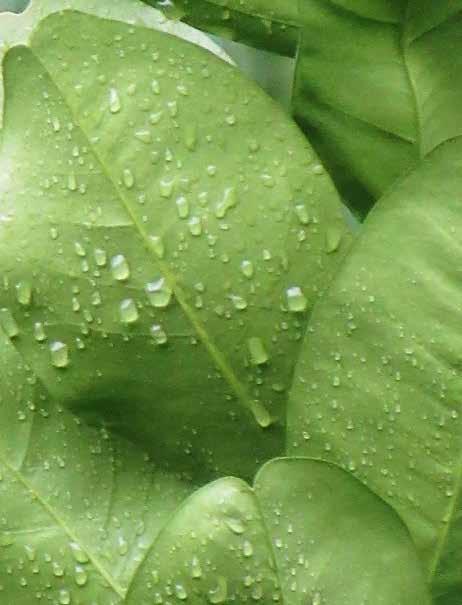
2023 February POETRY & WRITING © liveencounters.net S T E P H A N I E G R E E N
© Stephanie Green
©Mark Ulyseas
Photograph by Mark Ulyseas.
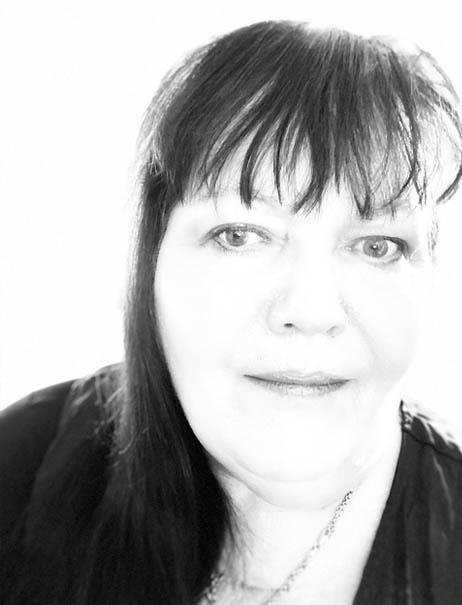
© liveencounters.net POETRY & WRITING February 2023 Celebrating 13th Anniversary B O O M E R A N G
Wendy J. Dunn
Wendy J. Dunn is an award-winning Australian author, playwright and poet. Her first Tudor novels were two Anne Boleyn novels: Dear Heart, How Like You This? and The Light in the Labyrinth. Wendy’s most recent publications are two novels inspired by the life of Katherine of Aragon: her Falling Pomegranate Seeds duology: The Duty of Daughters (a finalist in the 2020 Chaucer award) and All Manner of Things (2021), Silver Medallist in the 2021 international Readers’ Favorite Award for historical personage, Silver Medallist in The Coffee Pot Book Club Book of the Year Award (Tudor and Stuart category), a finalist in the 2022 Eric Hoffer Award and a first place win for Tudor fiction in the international 2021 Chaucer Award. Wendy tutors in writing at the Swinburne University of Technology. She’s currently writing a novel set in 2010. Of course, it includes a Tudor story. She is also writing her first full length Tudor biography, commissioned by Pen and Sword.
Boomerang
Linda stirred the spoon around the half-empty mug. Watching the coffee swirl, she listened to the slow approach of her father. Every so often, his dragged, paralysed leg made a muted, clopping sound, catching up with the other on the carpet.
‘I found this to show you, Linda.’ Emerging through the kitchen doorway, her father held out to her a sheet of newspaper in the hand left unparalysed by the stroke that had struck him down over twenty years ago. Linda reached for the paper.
‘There’s an article there you’ll find interesting. These nuns in Ireland, see, tortured children in their orphanage.’
Linda put the newspaper down onto a pile of papers on the table. ‘Dad, a few bad nuns doesn’t mean the whole breed’s bad,’ she murmured. She wondered again why her father always wanted to prove to her that all religious people were sly and evil, as if determined to overturn the comfort of her beliefs. She almost laughed, thinking her father was the reason she had sought that comfort from her earliest years.
‘You know, Linda, my father was a cruel man. When I was seven, he made me help him drown these puppies I found…’
Linda’s eyes darted across to her father, hearing the often-repeated story — remembering the countless kittens she had watched him drown. Pondering too about how the same life pattern repeated itself generation after generation. It was so true; the sins of the parent were revisited upon their own children. Have I broken the circle in my own life?
2023 February POETRY & WRITING © liveencounters.net W E N D Y J D U N N
© Wendy J. Dunn
Troubled, Linda looked down to see on the front page of the newspaper a brief article about mad cow disease.
‘Do you remember the trouble we had with our cows?’ Linda tossed him the next thought to pass though her mind, something — anything — to steer her father away from his father’s cruelties. To stop herself from thinking about her father’s cruelties. That’s in the past. He’s an old, sick man now.
Linda froze, aware of time speeding her to another place. One by one, something else replaced those final physical remnants of her youth: long hair for short, soft, firm skin for skin losing its elasticity, drooping breasts; the list went on and on. Was she guilty of squandering time? Who was it who’d spoken of the past and future being here in the now, that time in its transient nature flowed in a circular pattern, always returning to the source…
The pitch-black skies vibrated with thunder. Barely seconds afterwards, bolts of lightning illuminated the night — dramatically turning the evening sky, with its heavy rain clouds, into brief visions of fairy worlds painted gold to blue, then finally purple, before disappearing back into the night.
The teenage Linda was beyond caring about the beauties revealed by the summer’s storm. Back wedged tight against a wardrobe door, she sat in a foetal posture, arms wrapped around drawn-up knees, sobbing and sobbing.
To her left, a short wall formed an alcove in the room before it did a turn for the doorway, hiding her from the view of someone looking into the bedroom. Even though she hid to avoid yet another physical assault, the girl had no desire for self-preservation. Pain was one thing. If there was an easy way for her to gain death, she would have seized it with both hands.
Breaking through her stifled sobs, amongst the often repeated ‘I didn’t mean to do it,’ was a continual chant: ‘God, please let me die, please let me die.’
© liveencounters.net POETRY & WRITING February 2023 Celebrating 13th Anniversary
*
B O O M E R A N G
She sobbed and rocked, rocked, and sobbed — saying over and over the almost incoherent words. The girl Linda forgot any other purpose of language other than to express despair and prayers for death.
Somewhere outside, the boom of her father’s voice competed with the roar of thunder. ‘Stupid bitch. Just wait ‘till I lay hands on her. I’ll kill her for the worthless slut she is! Stupid, stupid bitch!’
Linda involuntarily shivered.
Less than thirty minutes ago, she had been walking down her family’s long, gravel driveway. Kilometres away, a wind gathered strength and momentum, howling and whining, cutting through the surrounding countryside. Leaves lifted from the ground, swirling, hitting gently against Linda’s skin while her loose hair lifted and tickled her face.
Stopping, Linda looked up. Forks of lightning streaked across the darkening skies. One, two, three, four, she counted between the drums of thunder. Before the next loud boom, Linda heard the mooing of a distressed cow. Running towards the sound, the thunder hurt her ears and lightning bolts tore across the sky. Around her, the wind savagely keened, bowing tops of trees in its path, forcing her to fight her way forward. Safety told the girl that she was mad to be in this heavily treed garden in the middle of a violent thunderstorm. But how could she go inside and know she had left a frightened Sally and her newborn calf out in this savage storm?
Nearing the paddock fence, she could see the cow moving frantically around the corral, her terrified calf in danger of being trampled. The wooden corral, built on the property by the farmer who owned the property before selling it to Linda’s family, had a steep ramp. Once used for market days, when sheep were herded into the closed-in ramp, then up and over the fence into a waiting truck, Linda’s own family rarely used the corral and only for animals such as Sally.
Sally, gentle but dumb, was unlikely to use the ramp to gain her freedom. Good thing too — the drop might kill her. But, to the girl’s horror, she now saw the cow backing itself into the ramp. Linda ran, thinking that she could stop the Sally before she reached the top.
2023 February POETRY & WRITING © liveencounters.net
W E N D Y J D U N N
© Wendy J. Dunn
It didn’t cross her mind the frightened cow would become even more agitated at seeing her. So frightened it continued backing, almost in a clumsy run now, reaching the point where there was no place else to go but up and over. At this same moment, her father appeared, yelling above the wind: ‘What have you done!’ Both of them watched the cow going over the end of the ramp, falling with a tremendous crash on the outside of their property.
Her father turned. ‘You stupid, bloody bitch! You killed the cow!’
Linda took one look at her father’s bulging eyes and reddening face and ran as fast as her legs could take her. Weeping, Linda sneaked in through the house’s back door, seeking refuge in her older sister’s room. Believing she had killed their precious cow, and her father had yet another reason to think her worthless, her despair broke within her like heavy waves crashing onto rocks. *
For Linda, some memories were so nightmarish it was easier to pretend that she had dreamed them rather than own them as a memory. At other times, she had difficulties even distinguishing between the two — her dreadful dreams and her frequently dreadful, long-ago reality. Dreams and reality… two climbing plants, fighting for possession of a solitary post, so intertwined it was almost impossible to separate one from another—entanglement beginning where the eye (or consciousness) could not see, under the ground, the roots fighting for survival. Painfully delving at this point could mean dreams and reality—the imagined and the real—being sucked into a repressed void that woke her screaming in the night.
She stood up, hurriedly wiping away her tears, when her father found her in the room. She was just sixteen, but this didn’t stop him from breaking her spirit. Before this horrible night, she’d bravely speak her mind, gritting her teeth when the belt came off and the beating began. She had discovered early in life, covering herself as if with the cloak of Perseus, that there was a deep place within — somewhere she could step beyond her body, and hide. In the past, her spirit retreated to this place, eventually re-emerging triumphant. It reaffirmed her hard-won beliefs she was strong and courageous — beliefs stones to this place.
© liveencounters.net POETRY & WRITING February 2023 Celebrating 13th Anniversary
B O O M E R A N G
Now Linda found she deluded herself. Her father, even though always maddened by her silence, usually stopped the whipping before it went too far. But this night not only was the belt used but, when that didn’t have the desired effect, her father’s powerful fists hit out at her, punching her to the ground.
As these blows continued falling on her body, she felt her interior fortress, that ‘mock castle’, which hid and protected her spirit, tremble. Pain trickled through to her consciousness, eroding away at the fortress’ foundations. The trickle then became a tidal wave of agony, ripping away the last delusion of protection. Drowning now in her own fear, the girl had no will or strength to stop going under.
*
‘Linda- did you hear what I said?’
‘What, dad?’ As if with an electric jolt, Linda returned to her father’s kitchen. ‘Off with the fairies, I ‘spose—just like when you were a kid.’
She looked at him; content she no longer hated him. The terrible stroke had gone a long way toward that—striking him down when she was nineteen. She saw it then as a deserved judgement. Twenty-one years later, it was no longer so black and white. Was it just because of duty she was here?
*
There was another memory, another memory of a summer’s storm. Two little girls sat side by side in an open window, swinging their chubby, infant legs over the sill, watching a magic show in the sky. Behind them, their father’s loud voice boomed. One girl listened with fascination as he told them of the Viking god Thor.
‘Listen, girls. All that noise is mighty Thor, banging away at his anvil in his blacksmith shop.’
2023 February POETRY & WRITING © liveencounters.net
W E N D Y J D U N N © Wendy J. Dunn
The younger girl listened to the loud hammering of thunder, rattling the slash window above her head, while having visions of a giant, bearded being - imagined in her mind to be like a twin to her own father. The god’s beads of work-toiled sweat turned into the hot raindrops now pattering on her legs.
He broke off this connection, this gift of storytelling, his way of expressing love when she was nine. It was one of Linda’s clearer memories — the child Linda standing falteringly in her brother’s bedroom doorway as her father told her little brother a blood stirring ghost story. When Linda moved, he looked at her for the first time. He stopped the tale. ‘This is not for you — you’re too old!’ Knowing the warning signs by then, Linda fled to her bedroom. But her father couldn’t take his gift for storytelling back. By the time she was nine, she’d already made it hers.
Much later, when she was a woman with growing children, she understood better the circumstances of his life that had made him bitter, self-destructive, and destructive to those he loved — circumstances boomeranging back his own father’s cruelty.
All his life, her father could not see that one thing making life worth living is learning to improve upon a previous pattern—to understand the mistakes of an earlier generation so as not to repeat them. Recognising the boomerangs thrown out so we return the right ones.
Linda gazed at her father, thankful life had given her these long years to free herself from hating him. And when she had stopped hating him, forgiveness finally came — and freeing her from the past. Yes, we stand today in the harvest of our yesterday’s, bearing all the seeds for our tomorrows. But human beings always have a choice, determining which seeds they bear for future harvests. She pushed away from under her nose the pile of newspapers, walked to the bench to refill the coffee cup, and returned to listening to her father’s stories.
© liveencounters.net POETRY & WRITING February 2023 Celebrating 13th Anniversary
B O O M E R A N G
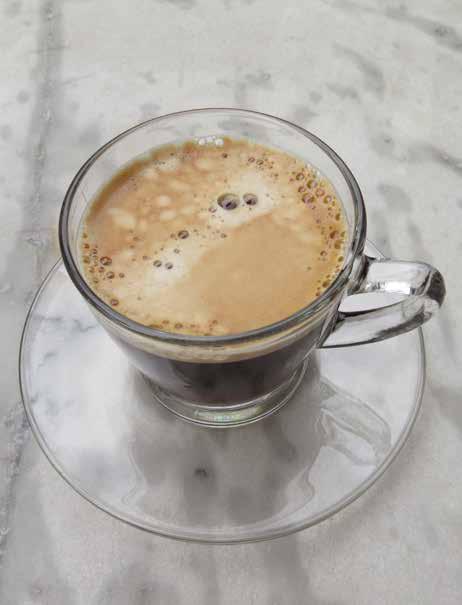
2023 February POETRY & WRITING © liveencounters.net W E N D Y J D U N N
© Wendy J. Dunn
©Mark Ulyseas
Photograph by Mark Ulyseas.
Jordan Smith is the author of eight full-length books of poems, most recently Little Black Train, winner of the Three Mile Harbor Press Prize, Clare’s Empire, a fantasia on the life and work of John Clare from The Hydroelectric Press, and The Light in the Film from the University of Tampa Press. He has also worked on several collaborations with artist, Walter Hatke, including What Came Home and Hat & Key. The recipient of grants from the Guggenheim Foundation and the Ingram Merrill Foundation, he lives with his wife, Malie, in upstate New York, where he plays fiddle and is the Edward Everett Hale Jr., Professor of English at Union College.
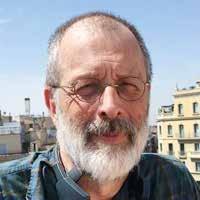

© liveencounters.net POETRY & WRITING February 2023 Celebrating 13th Anniversary
J O R D A N S M I T H
To purchase, contact Jordan Smith at smithj@union.edu
Lynn Strongin is a Pulitzer Prize nominee in poetry. A recipient of a National Endowment Creative Writing Grant, nominated twice for Pushcart Prizes, Lynn Born in NYC at the end of the dirty thirties, she grew up in an artistic Jewish home in New York during the war. Earliest studies were in musical composition as a child and at The Manhattan School of Music. Took a BA at Hunter college, MA at Stanford University as a Woodrow Wilson Fellow. Lived in Berkeley during the vibrant sixties where she worked for Denise Levertov and took part in many peace demonstrations. Poems in forty anthologies, fifty journals; Poetry, New York Quarterly. Forthcoming work in Poetry Flash and Otoliths. Canada is her second home. The late Hugh Fox said Strongin is the “most exciting poet writing today.’ Danielle Ofri wrote to her, “you tear the veil off that mysterious disease polio.” Strongin’s work has been translated into French and Italian. Her forthcoming book is THE SWEETNESS OF EDNA. She recently received a ten-thousand dollar George Woodcock Grant for Writers. This grant has greatly facilitated her work at the present time.
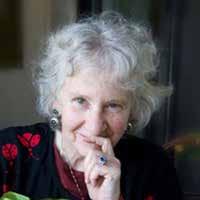
Lynn Strongin
Review of Jordan Smith’s Cold Night, Long Dog
Ambidextrous Bloodhound Press
December 2022
Jordan Smith’s Cold Night, Long Dog is a beautifully crafted book, a pilgrimage, a quest for calm acceptance even in a state of lost hope, disappointment. Kintsugi, a Japanese word for broken pottery whose cracks are mended with gold, mends the flaws of life. This work is widely referential. And reverential. An anonymous troubadour wanders thru its pages “To see a little to one side / where flame and flame’s shadow open their hands.” There are references to Basho and Auden, I Ching and Dao. Poems scroll down, like Chinese scrolls but in the American vein either detailed: “a two-bedroom house / On West Church Street” or sweeping, Whitmanesque views of the Hudson River Valley. How to survive at wit’s end the poems explore with provisional answer.
Music and art are the saving graces. Smith’s body of work communicates a love for the old hymns: a passion for music echoing a troubadour’s imagined song, perhaps from Anjou. Jazz, America’s classical music, echoes in “Listening to the Opera.” Rhyme is used to subtle effect no more with its opposite, encore. Smith’s are quite consistently earth colors, colors reminiscent of Bruegel: the great master artist creates teals which bend the heart, dark, long nights hover over his bent, poverty-stricken peasants in the medieval world; the world does not change. The second pandemic summer, ironically, has an eerie glow. In a favorite, “Poem Beginning with a Line Misattributed to one of the troubadours,” the line is quoted, “Life got complicated, and the pears aren’t ripe.” One puzzles how the two are the pears not ripe? the lover may not have been accepted; harvest might have been delayed by the lady’s husband. This is a universal plight but locating it in Anjou suggests the uniquely shaped golden color of the pears. The predicament is looked at from various positions becoming more and more complex like a revolving object. Finally, the poet addresses the world in a time in which the plague might have abated. One gets ‘a taste for the grit left at the bottom of the tiny cup. In “The Distinguished Thing,” one imagines “the knife-edge we climbed / carrying an empty bowl that begged to be broken.”
2023 February POETRY & WRITING © liveencounters.net L Y N N S T R O N G I N ©
Lynn Strongin
“Written in the Flyleaf of a Biography” one wishes a book to continue, “The one to redeem all the others.” The riddle of the Sphinx, or Wyatt’s Riddle is that one has “little time left”. A momentary enchantment lapses, the mainsail of a little boat. . . All life becomes labor again, one closes notebooks, caps pen and, most importantly, caps wit: one is left “at wit’s end.” This sense being at wit’s end is followed by the title poem asking what color is a “plague sky” Smith references the great Breughel painting of winter, hounds after spare catch over a teal iced lake, leading downhill. Bosch has a fierier sense of impending doom. Beginning with a plague sky, Smith’s last line echoes the bible “On earth as it is in heaven.” The clarity of freezing night with the lights of home looms. Suddenly the disturbing out-of-kilter image of the black dog appears beside the poet, coat glistening. The dog arcs us back to Breughel linking medieval with modern world. Nothing changes. Hunters return to an unchanged village; taste of ash is everywhere, the lover fled. “Wyatt’s Riddle” is a poem that floats, a rather ethereal, Oriental atmosphere of catching wind in a net. This environment is rare in Smith’s work.
“There are prophets who tremble as the mode of music changes” (“Near Disasters.”) There is always further misfortune.” But mystically, the gatekeepers or custodians do arrive. “They tune their radios to the new station, they hum along.” The prophets have the last word, staying outside the door waiting “to tell us how wrong we always were,” a thing we knew always.
Standing back from the canvas of, Cold Night, Long Dog, foreboding is a backdrop In the final analysis, where has this pilgrimage of the nameless ageless troubadour (who can be each one of us) led? it’s hard to love a world so harsh and arbitrary. Wyatt’s riddle is that we cannot catch the wind in a net. Jordan, It calls to mind Basho’s “snow-viewing party.”
This is an oblique look at history, a book written in the wisdom of age knowing texts are left undiminished “and that suppleness wins over grip.” The conclusion of “The Distinguished Thing” reminds me of Basho, too” we climb “Carrying an empty bowl that begged to be broken.” If it is broken, it will be mended with gold.
© liveencounters.net POETRY & WRITING February 2023 Celebrating 13th Anniversary
J O R D A N S M I T H
If there is an overall message it’s that “the soul must prepare itself for life’s work whose name is death.” Brilliant details convey the intrusion. (“The basement bookshop” the “dark beer at Pfaff’s”.). “Listening to the Opera, evokes” a grandmother’s room stacked with old 78, her Victor Book of the Opera. One can smell lavender, see old lace in the house On West Church Street The grandmother vanishes with little sound more “Than the hiss at the record’s / End.” One speaks of the papery things of age.
“A little Noir Music” puts “Some brightness in the tone” which is a brightness of moon. The poet, however, winds up: ‘Put the knife in your right pocket.’ This is the noir.
I keep going back to the melding of opposites; dove-tailing aura with acceptance of memory fading out and in at times evoking the ghostly. Both dark and light make the images of the final poem (dedicated to Marvin Bell,)“Questioning the Dead Man” In one poem, the dead man is described as “perspective itself, the universal fixed to a pinpoint. …” one of Smith’s mentors and Marvin Bell’s main work is The book of the Dead Man” which, as the New York Times points out, he has been writing for a quarter of a century beginning at age fifty three. “While the Zen admonition — Live as if you were already dead — may embody a lively challenge, these poems, too, tip their hats with greatest respect and fanciful care for the living mystery that holds us all.” (Naomi Shibab Nye. Strongly influenced by Bell, Smith closes the book with an acceptance of reticence, in the contradictory title of the poem. the Kintsuri, the gift and precious metal thread mending cracks which helps us accept our flaws with grace.
2023 February POETRY & WRITING © liveencounters.net
L Y N N S T R O N G I N
All quotes are from Cold Night, Long Dog unless otherwise noted
© Lynn Strongin
Magdalena Ball was born in New York City, and has lived in Australia for over three decades. She is a novelist, poet, reviewer, interviewer, VP of Flying Island Poetry Community, and Managing Editor of Compulsive Reader. Her stories, editorials, poetry, reviews and articles have appeared in a wide number of printed anthologies and journals, and have won local and international awards. She is the author of several novels and poetry books, and runs a podcast of writer interviews called Compulsive Reader Talks. http://magdalenaball.com/

Available at: https://puncherandwattmann.com/product/bobish/ and Amazon.com
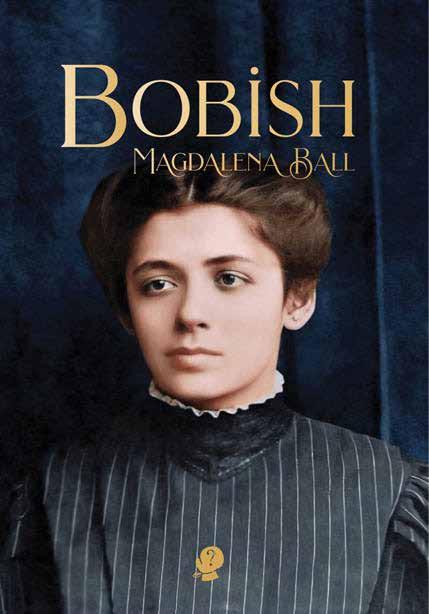
© liveencounters.net POETRY & WRITING February 2023 Celebrating 13th Anniversary
M A G D A L E N A B A L L
Kassia Klinger is an author, advocate and presenter. She is the author of the narrative nonfiction Confessions of ethical investing (2014) and op-ed Red Zone Lives Matter (2018). In recent years Kassia has penned two novels plus two short stories, all based on true stories. Her first novel is set on a hippy commune in 1970s Nimbin and the other during recent times in The Hunter Valley. https://www.kassiaklinger.com/About.html

Kassia Klinger Review of Magdalena Ball’s Bobish
Puncher&Wattmann
ISBN: 9781925571601, Paperback, January 2023, 154 pages
Bobish is the epic life story of Rebecca a migrantgirl. Torn from fear-ridden Eastern Europe she is swept along, across mountainous waves to an unknown future in the land of the free. It could be a rags to riches story... instead it’s a life of horror, pain, neglect and abuse; yet despite dark-forces buffeting this young hopeful’s life, love shines eternal. Below crushing poverty Rebecca’s life is rich in language, memory and culture.
Ball has written a short and not so sweet lovestory to her great grandmother. Ball explores the journey from grimy villages filled with antisemitism in the old country to the bustle and exploitation of the new, York early in the 1900s. It paints her mother’s mother’s mother Rebecca full of beauty, wonder and strength. While sparse of word it is evocative. Bobish plumbs the depth of belonging, dislocation and longing. Ball brings sights, sounds, smells, tastes and touch into focus - sometimes with a thud.
Bobish is brilliant. A short life in six acts, sixtyfour poems filling the void and not a single forced rhyme. Bobish is beautiful. A great achievement.
2023 February POETRY & WRITING © liveencounters.net
K A S S I A K L I N G E R ©
Kassia Klinger
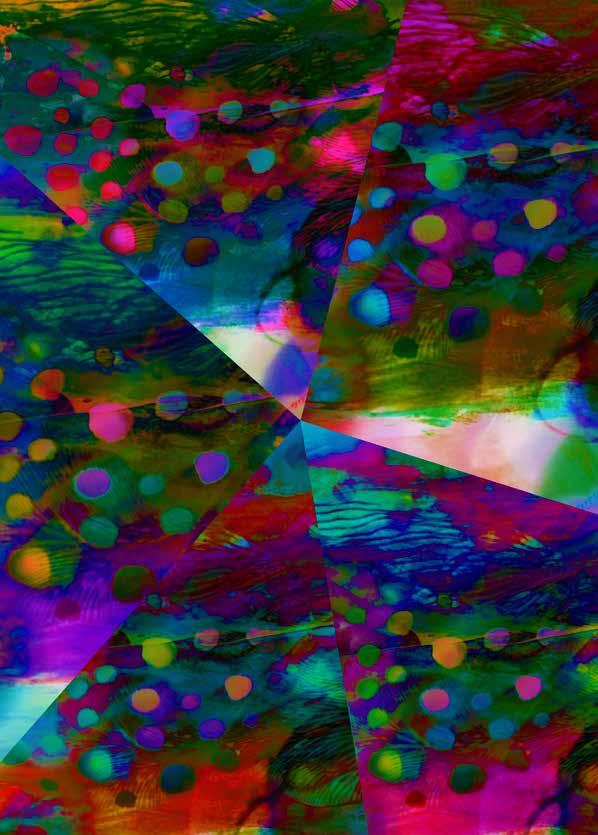


Free Online Magazine From Village Earth February 2023 P O E T R Y & W R I T I N G 2010 - 2022
Cover
Artwork
by Irish Artist Emma Barone




































